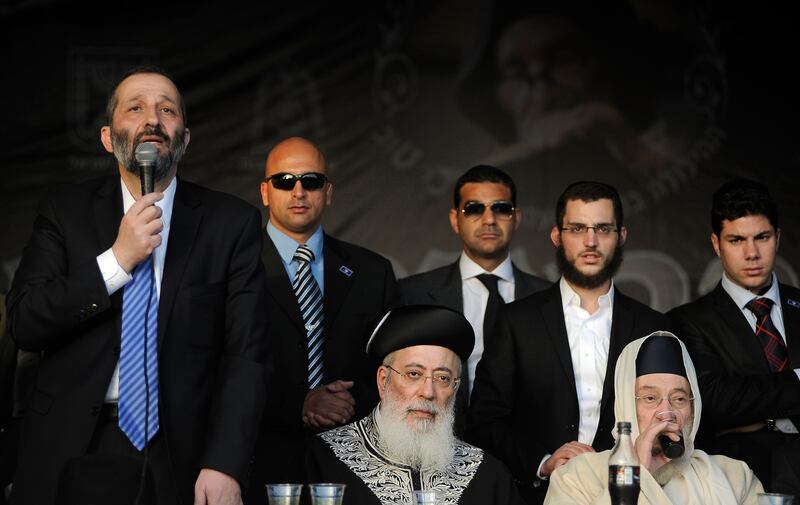Rabbi Abraham Kook described what he believed to be the three basic pillars of Judaism: the Torah of Israel, which basically represents the crystalized expression of God's will; the People of Israel; and the Land of Israel.
Today, we have two sets of religious parties in the Knesset. One set, the ultra-Orthodox parties (Degel Hatorah and Shas), serve as a subsection of the People of Israel, the only subsection that they deem to be truly legitimate heirs of our ancestors—their own community. The other set, the National-Religious party (Habayit Hayehudi), serves the land of Israel. Both parties will sacrifice anything upon the altar of their respective causes, and neither of them is serving the cause of the Torah. Therefore, they are both guilty of a form of idolatry.

Shas is now posing as one of the most pro-peace parties in the Knesset. In rhetoric that sounds like it has come straight from the far left, a senior Shas official told Haaretz last week: "We are going to walk all over the settlements, we’re not afraid. We’ll vote to evacuate outposts, we’ll vote to freeze construction, we’ll support diplomatic initiatives, we’ll vote to cut funding to the settlements.” But hold on, isn't this the same party who's spiritual leader, Rabbi Ovadia Yosef, has publicly prayed for Mahmoud Abbas to vanish from the face of the earth? And now he wants to jump into diplomatic initiatives with him? Why the change of mind? Has he suddenly taken to heart the Bible's injunction to strive for peace (Psalm 34)?
No. Instead, Shas has realized that Netanyahu is facing the following choice. Either he can form a government with Lapid and Bennett that will make no meaningful progress towards peace (as long as Bennett is on the scene), though it will revolutionize the current status-quo regarding the place of the ultra-Orthodox in society. Because, in that plan, ultra-Orthodox Jews will be drafted into the army like everybody else—and they will undoubtedly lose millions of shekels of government money. Or, Netanyahu can form a government without Lapid and Bennett, though he would need to woo the disinterested Labor party by making a massive headway on the peace process. The special interests that Shas wants to protect are much better served by the second option, so their principles and fears about Abbas go out of the window—they are now the party of peace. In their disdain for Bennett, they've become so leftwing that they're joining the BDS movement by boycotting the settlements. Like I said, they are there to serve their community and will sacrifice all else upon its altar.
And Bennett's party is no different; it's just that they serve a different god: the land of Israel. During the election campaign, Bennett said that he was in favor of widespread draft exemptions for the ultra-Orthodox who, in the minds of many, serve the country by learning and toiling in God's words. But, in his maiden speech to the Knesset, it was all about sharing the burden. Indeed, he has made a pact with Lapid that has essentially placed the issue of the ultra-Orthodox draft at the top of the agenda. What sparked this change of heart? Did he suddenly realize that it is unfair for one group of people to defend the country with their lives, while the other gets to do it in an air-conditioned library? No. Instead, he realized that Lapid can realistically hope to push through only one major reform in this parliament—for Lapid, it's a choice between peace and the social agenda for which he campaigned.
Bennett doesn't want peace if it means substantial territorial compromises. Bennett's party serves the land of Israel, and it is happy to sacrifice the ultra-Orthodox on its altar. And so, Bennett has volunteered himself to be Lapid's sidekick, in return for no meaningful progress on the peace process. Some of his party's most extreme rabbinic figures, like Dov Lior, have publicly backed this pact, even though they have much more in common with the leadership of the ultra-Orthodox world than they do with the savvy Tel-Aviv media man, Lapid.
So, we have religious parties who serve the People of Israel, or at least one section of it. And we have religious parties who serve the Land of Israel.
But what about the God of Israel?
Idolatry occurs when you look down at the fruit of your own labor, the statue that you carved yourself, and you worship it. Instead, we should be looking up: up to that which lies beyond ourselves. We should transcend our own petty perspectives and learn to hear the voice of the other. A real religious party would be pursuing peace with the Palestinians, and it would be chasing after a more equitable distribution of the social burden. It would be fighting for both of these causes because it would have the largess of spirit that one receives when one looks beyond with wonder, not down at your own possessions with fear and cowardice. Meimad was perhaps the closest thing to the sort of religious party I'm envisaging. But, in truth, a religious Jew, seized by the broad perspectives afforded to her by her faith in a God that transcends all pettiness—who is fed up with all of this sectarianism—would probably not want to join a religious party at all.





